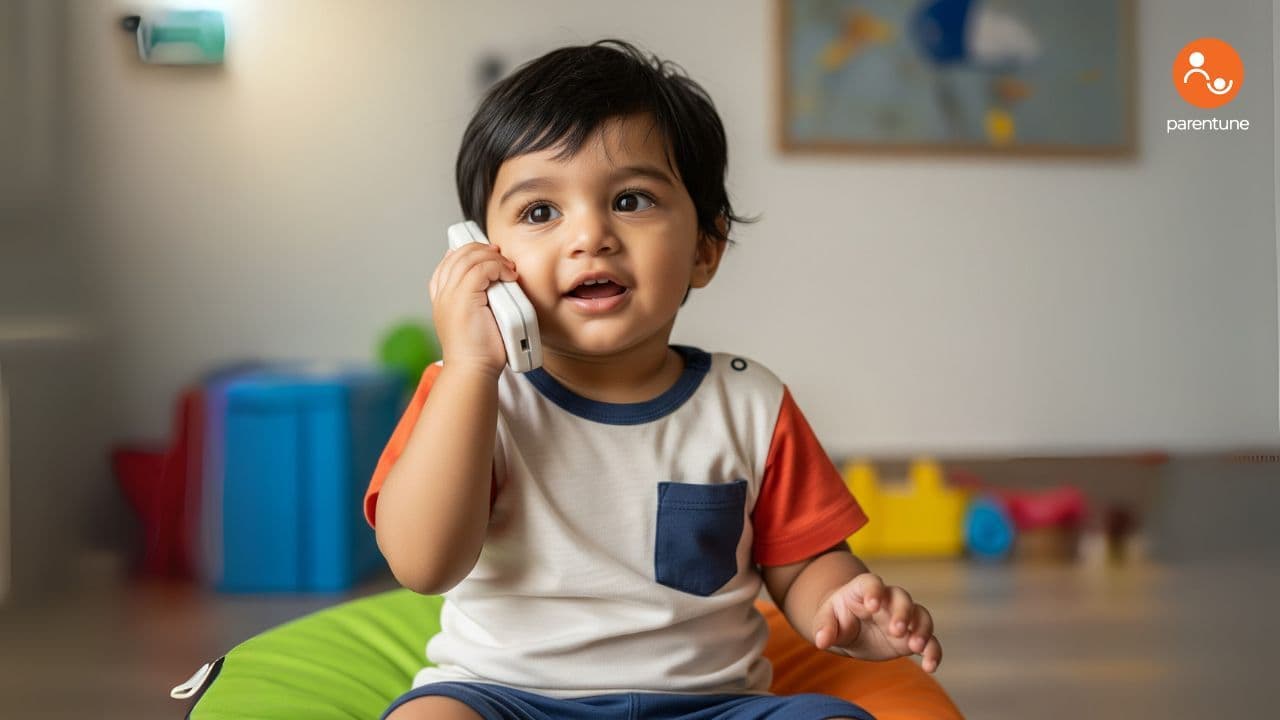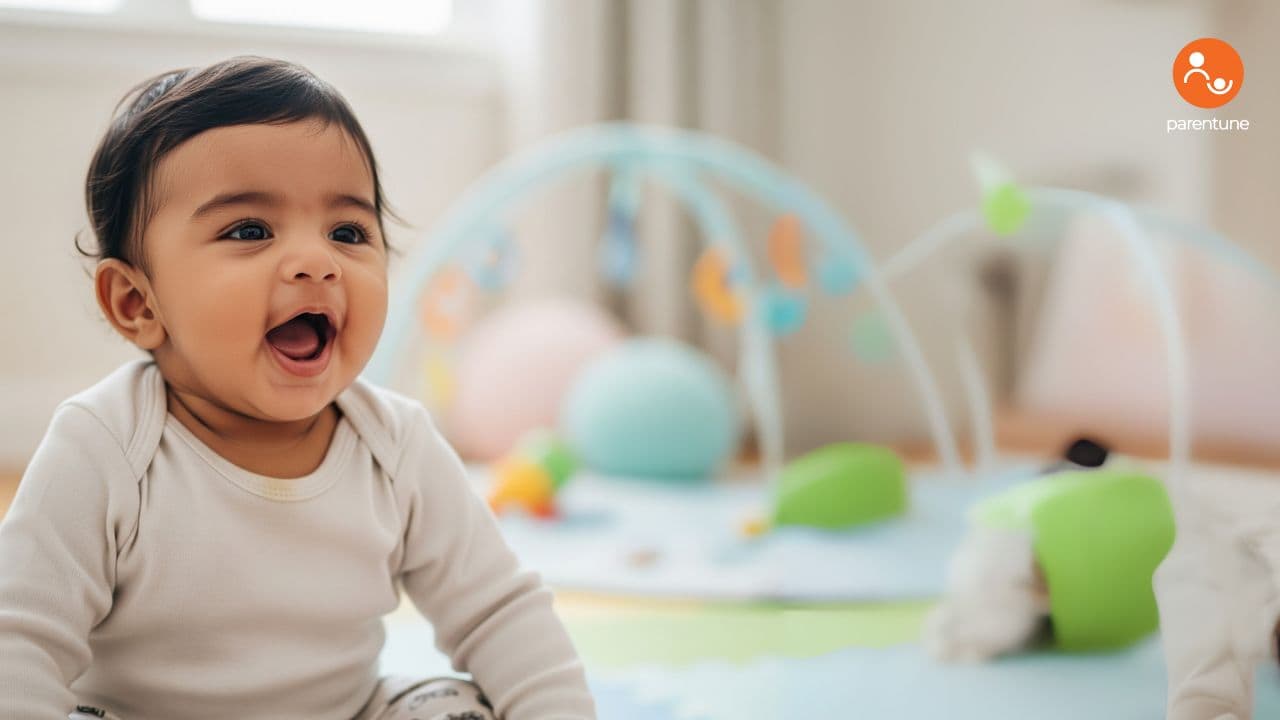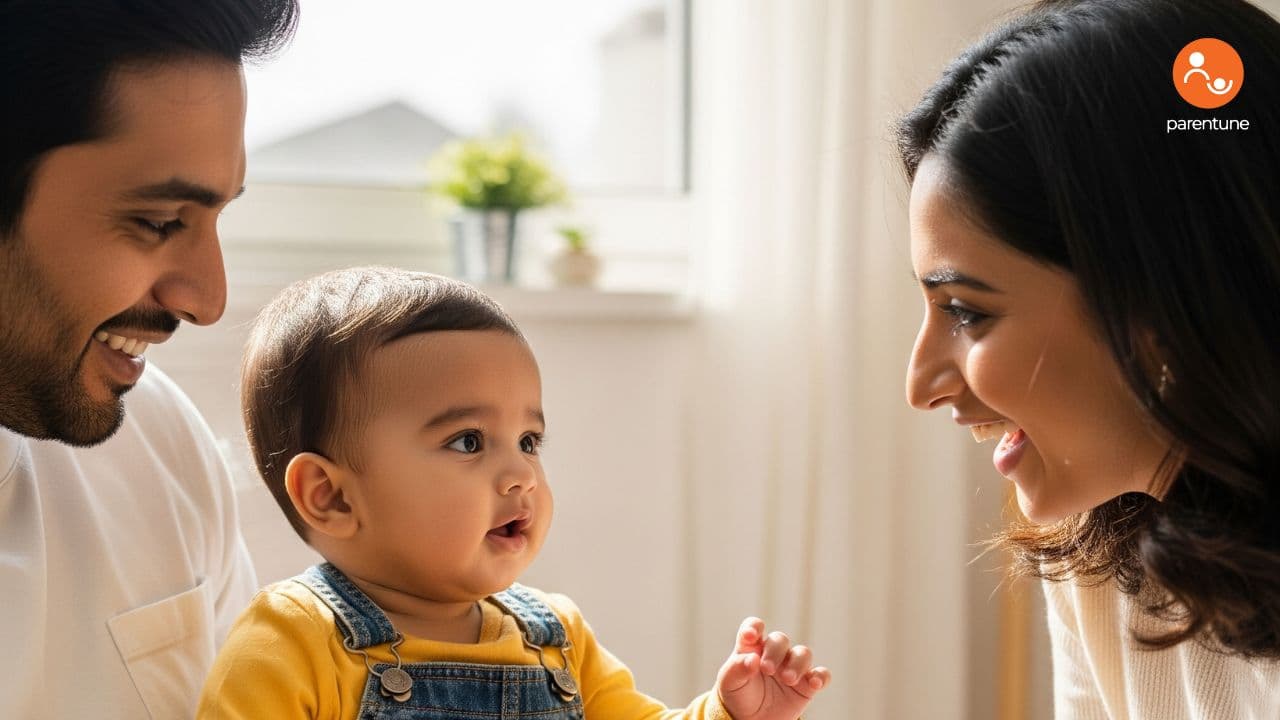developmental-milestones ...
When Do Babies Start Talking? A Month-By-Month Guide That Actually Makes Sense

Published: 11/07/25
Updated: 11/07/25
There’s a moment every parent secretly waits for.
Not the first step. Not the first smile.
The first word.
It’s one of those heart-splitting milestones—sudden, unscripted, and unforgettable.
But before babies say “mama” or “dada,” there’s a whole hidden language unfolding. Gurgles, babbles, hand flaps, eye contact—this is their pre-speech symphony. And if you’ve ever found yourself Googling, “Is my baby talking late?” or “When do babies actually start speaking?”—you’re not alone.
This guide decodes the timeline. Month by month. Milestone by milestone.
No fluff. Just what parents need to know—and what most baby books leave out.
Why Does Speech Development Matter So Much?
Because language isn’t just about words.
It’s how babies connect. Learn. Bond. Ask. Assert.
Speech is a mirror of the brain's development. A baby who coos at 2 months and babbles at 6 is not just being cute—she’s showing you that her cognitive systems are firing.
And when delays show up, they’re not just about late talking. Sometimes, they’re windows into deeper issues—hearing loss, neurodevelopmental differences, or social processing delays.
So yes—tracking speech milestones isn’t overkill. It’s smart parenting.
Learn more about Speech Delay in Children
Birth to 2 Months: The Sound of Survival
What to expect:
Your baby cries. That’s it. But that’s everything.
Those cries? They’re a communication system. Different tones for hunger, discomfort, sleepiness. And your response builds trust. That trust is the foundation for all future conversations.
What matters now:
-
Responding promptly to cries
-
Talking to your baby often, even if they can’t respond
-
Eye contact while feeding or soothing
Babies learn to speak by being spoken to.
2 to 4 Months: The First Coo
Cooing begins. Vowel sounds emerge.
“Ooo,” “Ahh,” “Eh.” It’s like nature’s warm-up act before the real speech show begins.
Your baby is learning how to control the muscles of the mouth, throat, and tongue. It’s physical training disguised as adorable noise.
What to do:
-
Imitate the coos back—it creates conversational rhythm
-
Smile, pause, and wait for “baby replies”
-
Sing lullabies to introduce melody and pitch

Related articles:
4 to 6 Months: From Sounds to Social Speech
This is when babbling begins.
“Ba-ba,” “Da-da,” “Ga-ga.”
Don’t get too excited about the “dada”—it’s not intentional yet.
But this is major. Babies are experimenting with syllables, tones, and patterns. You might notice they babble more when they’re happy, or when they see you smile.
Hidden system at play:
Babies this age start picking up on turn-taking. You talk, they wait. Then they “talk,” and wait for your reply. That’s conversation—just without the grammar.
6 to 9 Months: The Babble Gets Personal
Now things get intentional.
Babies begin to string syllables with more variation: “baba,” “gaga,” “mama.” You’ll hear intonation—some babbles even sound like questions.
They also start responding to their names, recognizing tone, and showing interest in object names.
What to do at this stage:
-
Label everything: “This is your spoon.” “Look, a ball!”
-
Use expressive tones—excitement, surprise, joy
-
Play “Where’s the dog?” with familiar items
Language grows fastest when it's part of play.
Also read:
9 to 12 Months: The First Words May Appear
This is the zone of the first real word.
Often “mama” or “dada,” but it could be “ball,” “hi,” or even “no.” The key is intentionality—they say the word and mean it.
Some babies may say one or two words. Others might be quiet but understand much more.
Look for signs of understanding:
-
Responds to “no” or “bye-bye”
-
Points to objects
-
Tries to mimic your tone or gestures
Comprehension always precedes expression.
12 to 18 Months: From Words to Wants
Vocabulary explodes—from 1-2 words at 12 months to as many as 20 by 18 months.
This is where the “naming game” takes off. Babies label everything: “dog,” “milk,” “car.” They also start using gestures with words—pointing, nodding, or bringing you objects.
What to nurture:
-
Keep TV off and faces on
-
Repeat and expand: Baby says “ball,” you say “Yes, red ball!”
-
Name emotions: “You’re sad because the toy is gone.”
The more you label feelings, the faster your child learns emotional vocabulary.
18 to 24 Months: Two-Word Sentences Arrive
Suddenly, you’re hearing phrases.
“More milk.”
“Go park.”
“Mama come.”
This is syntax in action. And it’s magical.

Key milestones to watch:
-
Uses 50+ words by 24 months
-
Combines 2 words
-
Follows simple commands: “Bring me the shoe”
Children also start echoing your phrases. If you say “Let’s go outside!” often, don’t be surprised when they start commanding you back.
2 to 3 Years: Full Sentences, Big Feelings
Now it’s storytelling time.
Toddlers start using 3–4-word sentences. They ask questions. They sing songs. They talk to themselves while playing. And yes—they argue.
You may hear things like:
-
“I don’t want it.”
-
“Where daddy go?”
-
“My turn now.”
Language becomes a tool for independence. For choices. For setting boundaries.
Big gains in this phase:
-
Pronoun use: “I,” “me,” “you”
-
Plurals and tenses begin to show up
-
Vocabulary jumps to 200+ words
What If Your Baby Isn't Talking Yet?
That question haunts more parents than we admit.
But here’s the honest truth: every child develops at their own pace. Speech isn’t a race—it’s a reflection of many overlapping systems: hearing, processing, social interaction, attention span, and more.
Delays aren’t always problems. But they are worth watching.
Red flags to look for:
-
No babbling by 9 months
-
No words by 16 months
-
No two-word phrases by 24 months
-
No interest in interaction or imitation
In such cases, early intervention helps. Tools like speech therapy, hearing tests, or developmental assessments can make a world of difference—especially when caught early.
Must Watch:
The Hidden Force Behind Every Talking Toddler
There’s no magic app. No perfect toy.
Just one factor that matters most:
The language environment.
Talking, reading, singing, pointing, labeling—that’s what grows a child’s vocabulary. And not just once in a while. Daily. Through routines. In conversations that feel like games.
At Parentune, we’ve seen this again and again. First-time parents sharing that their child wasn’t saying much—until they changed how they interacted. Until they found a rhythm. Or a community.
Sometimes all it takes is one insight shared by another parent who’s been there.
What This Means for You
Language isn’t taught. It’s caught.
From the lullabies you hum to the silly songs at bath time. From the way you describe your lunch to how you ask your child to hand over the toy.
Every word you speak is a thread in your child’s inner dictionary.
And just like that—speech becomes a shared experience. Not a milestone you chase, but a connection you build.
Want support from others navigating the same questions?
The Parentune community brings together parents and experts who walk with you through every “Is this normal?” moment. From your baby’s first cry to their first sentence—and beyond.
The Bottom Line
Babies don’t wake up talking one day.
They build their voice—syllable by syllable, sound by sound.
Here’s the core insight:
Children don’t learn to talk when they’re ready. They learn to talk when their world invites them to.
So build that world.
And when your baby finally says that first word, know this:
You’ve been having that conversation all along.
Be the first to support
Be the first to share

